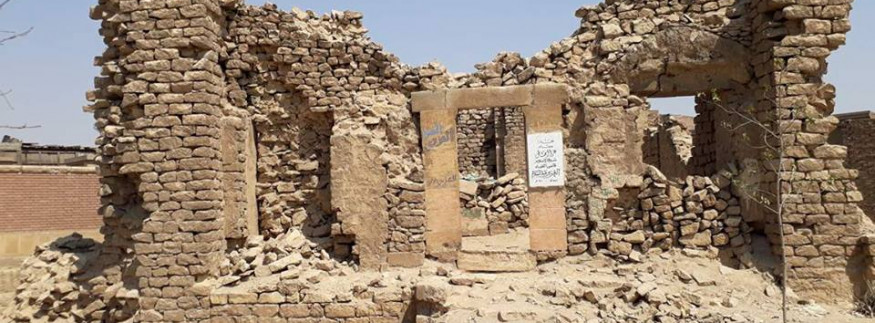Cairo’s Hidden Gems: Forgotten Building Pays Homage to a Great Man
arts & culture cairo Cairo's Hidden Gems city life Culture egypt Egyptians history Tourism travel
Nagla Ashraf
Some beautiful places remain undiscovered, and some are quite difficult to reach. Among the many cemeteries in El-Basatin area, behind the Mokattam hills that hide half the sky, there lies a deteriorating and roofless building. The randomly broken walls create some sort of tragic display, like columns half-eaten up by the toll of time, stones taken away by nature without permission.
But what could possibly be interesting about this place? There are barely any remnants of this monument except for a white sign announcing the nature of the place. It says, “Here lies the Shrine of the Greatest of Men, Sheikh of Islam, Chief of Justice, Al-Ezz ibn Abdel Salam.” This building has been standing, or at least what’s remaining of it, for around 1000 years. It was built after the death of Sheik Al-Ezz during the rule of Baibars.

Over the passage of time, not only has the building lost its awe, it has also lost some of its land. Some claim that residents of the area took over some parts of the original property. A significant part of Egyptian history left to die without any efforts of renovating it, or even attempting to prevent any more damage. Perhaps this is because of the lack of awareness about who Sheikh Al-Ezz ibn Abdel Salam was. So who was he?

Sheikh Al-Ezz was born in Damascus, but lived and died in Egypt. Aside from the praising labels on the sign, he was also crowned as the Sultan of Scientists, and the Seller to Kings. He embarked on his journey of knowledge at a young age, but after running into some troubles with the Sultan of Damascus, he travelled to Jerusalem (Bait Al-Maqdis), and from there to Egypt.

He was a noble man who always sought justice and constantly stood by his principles. After being exiled from Damascus, the Sultan sent for him to return, maintaining his status, under the one condition that he kisses the Sultan’s hand upon return. The Sheikh of Islam refused, stating that he would not accept and would definitely not allow himself to kiss the Sultan’s hand. He was respected among kings, and was known for his great efforts for the community during times of peace, and against the enemies at times of war, such as his stance against the Crusades and Tatars when they came to Egypt.

Such a great man’s monument cannot be left in this state. We need to support its renovation, so that his story, and the stories of all the great men and women in our history, remain known for generations to come.
recommended
 Restaurants
Restaurants
Cairo's Ramen Revival: 5 Must-Try Bowls Around the City
Asian Food Asian Restaurants Cafés
Cafés



